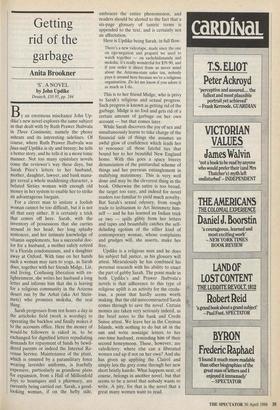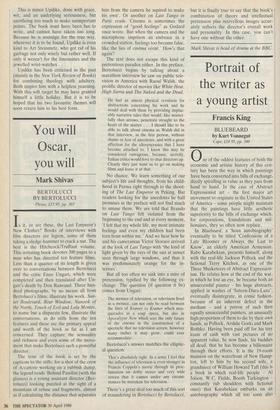Getting rid of the garbage
Anita Brookner
'S'. A NOVEL by John Updike
Deutsch, £10.95, pp. 244
By an enormous mischance John Up- dike's new novel explores the same subject as that dealt with by Ruth Prawer Jhabvala in Three Continents, namely the phony ashram and its interesting sidelines. Of course, where Ruth Prawer Jhabvala was faux-naif Updike is sly and breezy; he tells a better story, and he tells it in a more tonic manner. Not too many epistolary novels come the reviewer's way these days, but Sarah Price's letters to her husband, mother, daughter, lawyer, and bank mana- ger reveal a whole maddening character, a belated Sixties woman with enough old money in her system to enable her to strike an advantageous bargain.
For a clever man to imitate a foolish woman cannot be too difficult, but it is not all that easy either. It is certainly a trick that comes off here. Sarah, with the inventory of possessions that she carries around in her head, her long splashy sentences, and her intimate knowledge of vitamin supplements, has a successful doc- tor for a husband, a mother safely retired to a Florida condominium, and a daughter away at Oxford. With time on her hands such a woman may turn to yoga, as Sarah does, together with her friends Midge, Liz, and Irving. Confusing liberation with en- lightenment, she writes her husband a long letter and informs him that she is leaving for a religious community in the Arizona desert run by the Arhat (aka Art Stein- metz) who promises moksha, the real thing.
Sarah progresses from ten hours a day in the artichoke field (work is worship) to Operating the backhoe and finally makes it to the accounts office. Here the money of would-be followers is raked in, to be exchanged for dignified letters repudiating demands for repayment of funds by bewil- dered parents or indeed the Internal Re- venue Service. Maintenance of the plant, Which is ensured by a paramilitary force wearing lavender uniforms, is fearfully expensive, particularly as grandiose plans for expansion, from a Hall of Millionfold Joys to boutiques and a pharmacy, are currently being carried out. Sarah, a good- looking woman, if on the hefty side, embraces the entire phenomenon, and readers should be alerted to the fact that a six-page glossary of tantric terms is appended to the text, and is certainly not an affectation.
Here is Updike being Sarah, in full flow: There's a new videotape, made since the one on ego-negation and prapatti we used to watch together — on sachchidananda and moksha, it's really wonderful for $39.90, and if you order it direct from us never mind about the Arizona-state sales tax, nobody pays it around here because we're a religious organisation. Do let me know if you adore it as much as I do.
This is to her friend Midge, who is privy to Sarah's religious and sexual progress. Such progress is known as getting rid of the garbage. Midge is no fool and gets rid of a certain amount of garbage on her own account — but that comes later.
While Sarah discovers the joy of sex and simultaneously learns to take charge of the financial side of things she assumes an awful glow of confidence which leads her to renounce all those fateful ties that bound her to her beautiful New England home. With this goes a spacy breezy denunciation of the patriarchal scheme of things and her previous entanglement in stultifying matrimony. This is very well done and may be the cleverest thing in the book. Otherwise the satire is too broad, the target too easy, and indeed for novel readers too familiar to yield much novelty. But Sarah's sexual odyssey, from rough trade to lesbianism to Art Steinmetz him- self — and he has learned an Indian trick or two — spills glibly from her letters and tapes and beautifully catches the self- deluding egotism of the sillier kind of contemporary woman, whose complaints and grudges will, she asserts, make her free.
Updike is a religious man and he does his subject full justice, as his glossary will attest. Miraculously he has combined his personal research with his ability to enact the part of gabby Sarah. The point made in both Updike's and Prawer Jhabvala's novels is that adherence to this type of religiose uplift is an activity for the credu- lous, a point that hardly seems worth making. But the old unreconstructed Sarah comes through to save the novel. Certain monies are taken very seriously indeed, as the brief notes to the bank and Credit Suisse attest. We leave her in the Cayman Islands, with nothing to do but sit in the sun and write nostalgic letters to her one-time husband, reminding him of their second honeymoon. These, however, are valedictory: where else can a liberated women end up if not on her own? And she has given up applying the Clairol and simply lets the grey come through her new short bristly hairdo. What happens next, of course, belongs in another novel, but that seems to be a novel that nobody wants to write. A pity, for that is the novel that a great many women want to read.
This is minor Updike, done with grace, wit, and an underlying seriousness, but sacrificing too much to make unimportant points. The book must have been fun to write, and cannot have taken too long. Because he is nostalgic for the true way, wherever it is to be found, Updike is even kind to Art Steinmetz, who got rid of his garbage not only wisely but rather well. If only it weren't for the limousines and the jewelled wrist-watches . . .
Updike has been criticised in the past (mainly in the New York Review of Books) for combining theology with adultery. Both inspire him with a helpless yearning. With this soft target he may have granted himself a little holiday. But it is to be hoped that his two favourite themes will soon return him to his best form.



























































 Previous page
Previous page